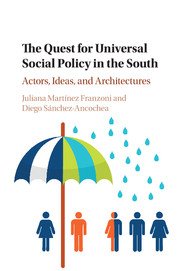Book contents
- Frontmatter
- Contents
- List of Figures
- List of Tables
- Acknowledgements
- List of Abbreviations
- Part I Universalism in the South
- Part II A Comparative Study of Policy Architectures
- 3 Policy Architectures and Universal Outputs Today
- 4 The Long-Term Influence of Policy Architectures
- Part III Building Universalism in Costa Rica
- Part IV Conclusions
- References
- Index
3 - Policy Architectures and Universal Outputs Today
from Part II - A Comparative Study of Policy Architectures
Published online by Cambridge University Press: 10 November 2016
- Frontmatter
- Contents
- List of Figures
- List of Tables
- Acknowledgements
- List of Abbreviations
- Part I Universalism in the South
- Part II A Comparative Study of Policy Architectures
- 3 Policy Architectures and Universal Outputs Today
- 4 The Long-Term Influence of Policy Architectures
- Part III Building Universalism in Costa Rica
- Part IV Conclusions
- References
- Index
Summary
Introduction
In the previous chapter we demonstrated the importance of promoting social policies that deliver universal outputs. Yet this is easier said than done: how can countries in the South build these policies? Much of the political economy literature answers this question by focusing on a small number of countries that managed to establish successful social programs. As we discussed in Chapter 1, the literature links these broad outcomes to the role of democracy (the more the better), partisan ideology (strong left-wing political parties are needed), and the influence of collective actors (unions and other social movements make a difference).
These macro-explanations illuminate key variables behind the building of universalism but also miss other important pieces of the story. They downplay the diverse ways in which countries have pursued this endeavor: even if democracy and political ideology are important preconditions, they cannot explain the specific ways in which policies are shaped and evolve over time. Democratic pressures may, for instance, trigger higher health spending aimed at the poor, but are unlikely to determine the funding and delivery mechanisms or whether benefits set the poor apart from the non-poor.
In this chapter and the next we address the role of policy architectures as an analytical device to study universalism in the South. We define policy architectures as the combination of instruments addressing eligibility, funding, benefits, delivery, and outside market options of specific social programs. The policy architecture is the blueprint of a policy as defined not just by single components but by the interaction among them.
Architectures influence universal outputs both in the short and the long term. In the short term, they define who receives what and how. Over the long term, by empowering a set of actors and creating incentives for the subsequent expansion of policies, architectures mediate the interaction between democracy and universalism.
In this chapter we look at countries with robust social policies to explore the diversity of architectures and how they constrain universal outputs. As explained in Chapter 1, we focus on Costa Rica, Mauritius, South Korea, and Uruguay – all considered in the literature as successful cases of social development (Huber and Stephens, 2012; McGuire, 2010; Sandbrook et al., 2007; Ringen et al., 2011).
- Type
- Chapter
- Information
- The Quest for Universal Social Policy in the SouthActors, Ideas and Architectures, pp. 49 - 69Publisher: Cambridge University PressPrint publication year: 2016



